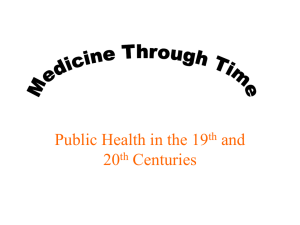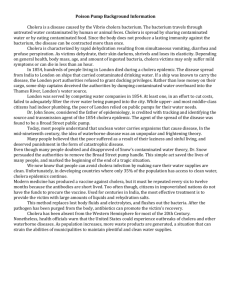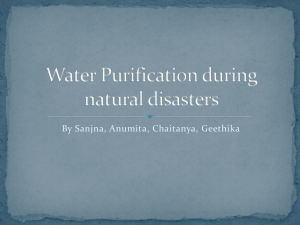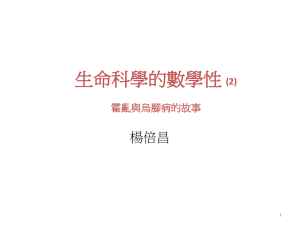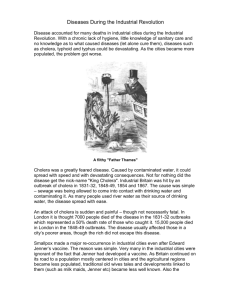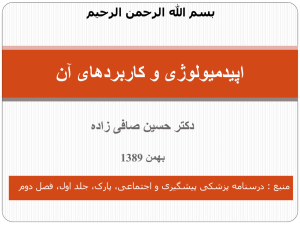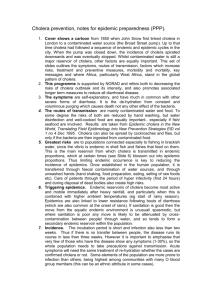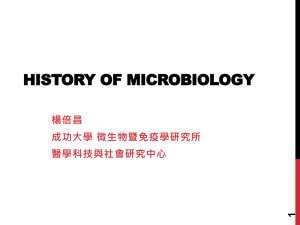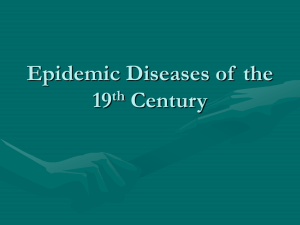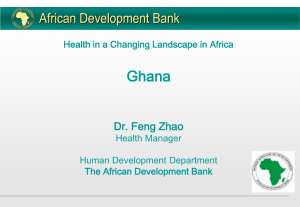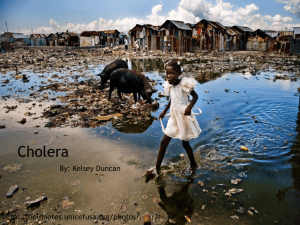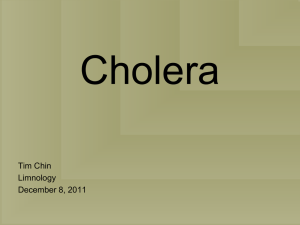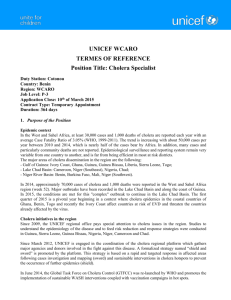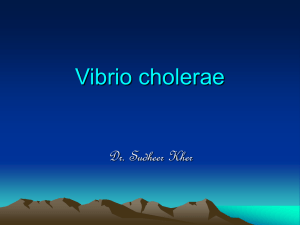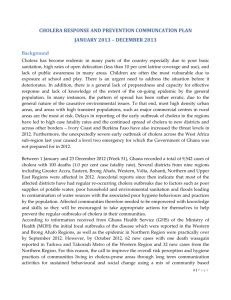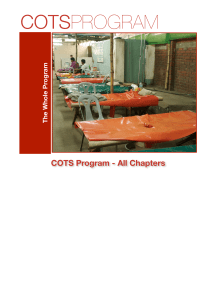Cholera in Ghana - Environmental Public Health Today
advertisement
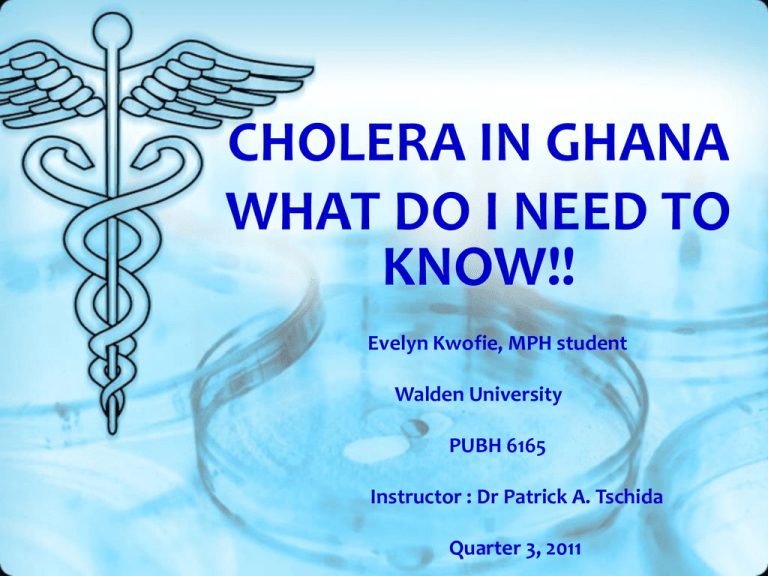
CHOLERA IN GHANA WHAT DO I NEED TO KNOW!! Evelyn Kwofie, MPH student Walden University PUBH 6165 Instructor : Dr Patrick A. Tschida Quarter 3, 2011 * An acute disease caused by ingestion of food or water contaminated by a bacterium called Vibrio cholerae * Feces contaminated water is the reservoir of infection and vehicle of transmission * Bacteria infects the small intestines resulting in large amount of watery diarrhea * Onset is typically sudden (2-3 days) (CDC,2011; WHO, 2011) • Last and first pandemic in 1970/71 • Now cholera is endemic in Ghana • Coastal sanitation poor along beaches • Number of major breakout decreased from 6-7 years to 3-4 years between 1971 and 2011 (Ghana government, 2011) • Last outbreak Sept 2010 Peaked March 2011 Regions affected the most were Greater Accra, Eastern region and Central region. The three regions accounted for 98% of cumulative total of 8,494 cases and over 99.8% of the 94 deaths as of May 14, 2011 Overall case fatality rate is 1/1% (Ghana government, 2011) * Both adults and children living in places overcrowded with inadequate water treatment and poor sanitation * People with low immunity i.e. people living with HIV and malnourished children are high risk (CDC, 2011). • By ingesting feces contaminated water and food • Flood leading to contamination of domestic water * Ingesting raw shellfish or raw oysters from contaminated waters • It is not from person to person (CDC,2011; WHO,2011) *Profuse painless diarrhea also known as rice water stools * Vomiting of clear fluid * Dehydration (up to 1000ml/hr diarrhea may be produced) * Low blood pressure and lethargy * Dry skin, dry mucus membrane or mouth * Sunken eyes and no tears * Rapid pulse * Muscle and abdominal cramps * Restless, irritability, tiredness and unusual sleepiness (CDC,2011;WHO,2011) * Stool or rectal swab sample are collected in early stage to the laboratory for diagnosis (confirm cholera bacterium) * IMMEDIATELY !!! * Use Oral rehydration salts (ORS) * If unable to get help right away or in absence of ORS homemade solution can be given. * Home made solutions consist of half a teaspoon of salt and six level teaspoon of sugar dissolved in one liter of safe water. * Plain water and rice water can be given if homemade solution is unavailable. * Remember to use safe water. If not sure boil the water before use and store it safely. (WHO,2011) • Immediate fluid and electrolytes replacement • Oral rehydration solution • Pre-packaged mixture of sugar and salt to be mixed with water (drink large amounts) • In severe cases intravenous fluid replacement • Antibiotics • Continue nutritious safe food and breastfeeding for infants and young children. (CDC,2011; WHO,2011) • Acute renal failure • Severe electrolyte imbalance • Arrhythmias (Abnormal hearth rhythms) • Coma • Severe dehydration leading to shock • Death (CDC,2011; WHO,2011) • Drink safe water • Frequent hand washing with soap and water • Appropriate disposal of feces • Boil, cook, and peel vegetables and fruits • Keep your living area clean • Sterilization of contaminated materials (CDC,2011; WHO,2011) • Continued public awareness and preventative measures teaching • Strengthen environmental surveillance • Evaluate preparedness programs for readiness for outbreaks • Monitor and investigate bacteriology cases • Encourage and enforce symptoms or case reporting • Possibly distribute ORS as part of emergency preparedness • Ghana government has developed : • - A national cholera prevention and control plan (2010-2011) and has been disseminated to key stakeholders. • National Task force has been formed • Government provided extra funds • Developed short to long term multisectoral plan (Ghana government,2011) • Update unaffected countries with latest information on the disease • Provide travelers with information regarding risks and symptoms of cholera • WHO enforce reporting of cases as per protocol • WHO supports and audit countries • Continue WHO global Task Force on Cholera control and prevention. (WHO,2011) - Cholera is fatal if left untreated - 80% cases of cholera can be treated with oral dehydration salts - Prevention, preparedness and response are essential. - 3 – 5 million cholera cases annually - 100 000 to 120 000 death due to cholera (CDC,2011; WHO,2011) • New variant strains detected in Africa and Asia • Cholera is an endemic in Ghana (WHO,2011) • Thank you ladies and gentleman for your attention on this important matter. • Public education 24 hotline open to public 0244727958 (Director of Public Health, Ghana Health Service) Centre for Disease Control and Prevention. (2011). Cholera. Retrieved on July 19,2011 from http://cdc.gov/cholera/disease.html Ghana Government. (2011). Press briefing on Cholera Outbreak In Ghana by Hon. Deputy Minister of Health. Retrieved on July 22, 2011 from http://www.ghana.gov.gh/index.php WHO. (2011). Cholera. Retrieved on July 23, 2011 from http://www.who.int/mediacentre/factsheets
